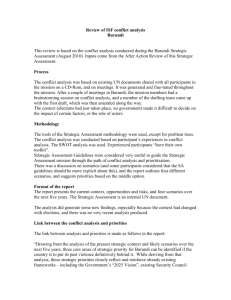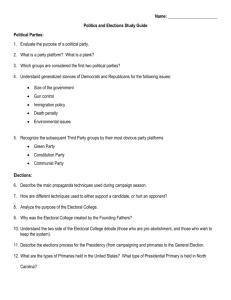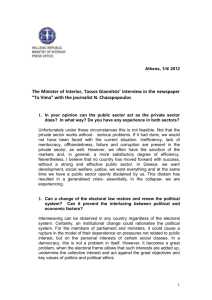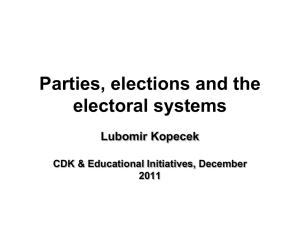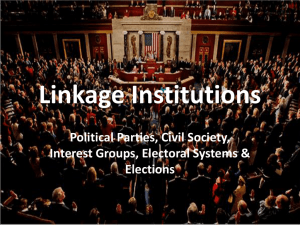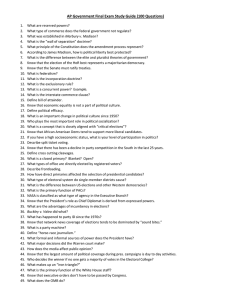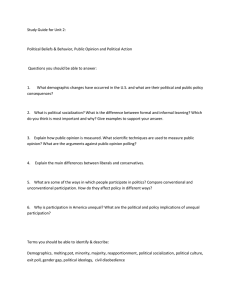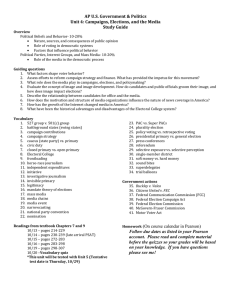S Security Council
advertisement
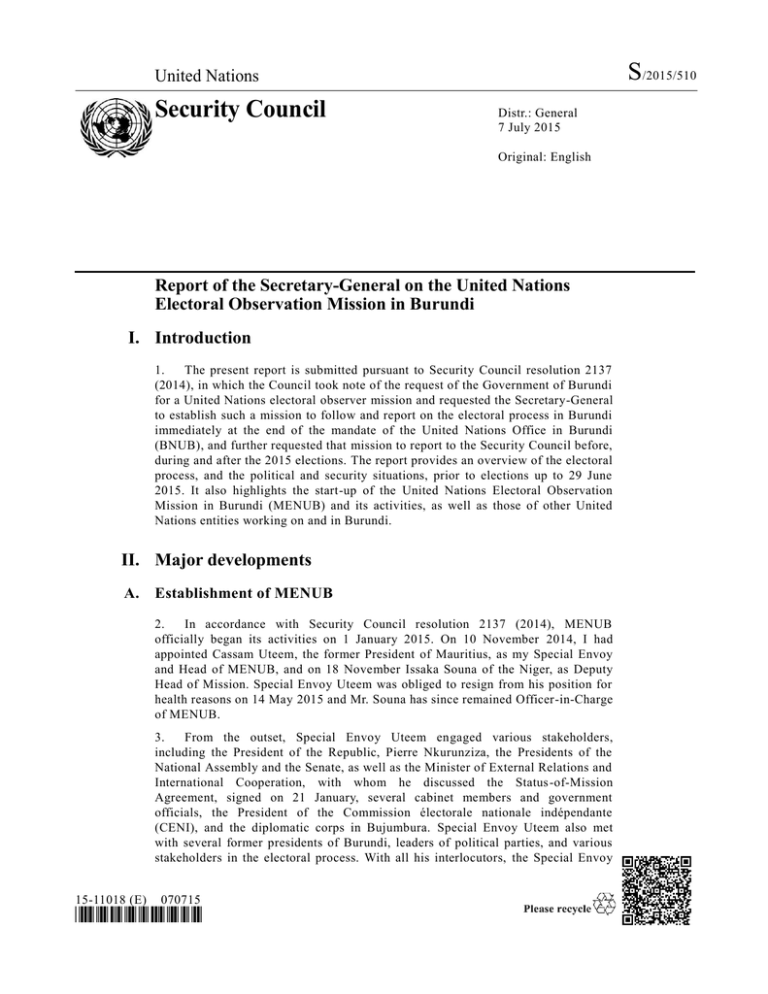
S/2015/510 United Nations Security Council Distr.: General 7 July 2015 Original: English Report of the Secretary-General on the United Nations Electoral Observation Mission in Burundi I. Introduction 1. The present report is submitted pursuant to Security Council resolution 2137 (2014), in which the Council took note of the request of the Government of Burundi for a United Nations electoral observer mission and requested the Secretary-General to establish such a mission to follow and report on the electoral process in Burundi immediately at the end of the mandate of the United Nations Office in Burundi (BNUB), and further requested that mission to report to the Security Council before, during and after the 2015 elections. The report provides an overview of the electoral process, and the political and security situations, prior to elections up to 29 June 2015. It also highlights the start-up of the United Nations Electoral Observation Mission in Burundi (MENUB) and its activities, as well as those of other United Nations entities working on and in Burundi. II. Major developments A. Establishment of MENUB 2. In accordance with Security Council resolution 2137 (2014), MENUB officially began its activities on 1 January 2015. On 10 November 2014, I had appointed Cassam Uteem, the former President of Mauritius, as my Special Envoy and Head of MENUB, and on 18 November Issaka Souna of the Niger, as Deputy Head of Mission. Special Envoy Uteem was obliged to resign from his position for health reasons on 14 May 2015 and Mr. Souna has since remained Officer-in-Charge of MENUB. 3. From the outset, Special Envoy Uteem engaged various stakeholders, including the President of the Republic, Pierre Nkurunziza, the Presidents of the National Assembly and the Senate, as well as the Minister of External Relations and International Cooperation, with whom he discussed the Status -of-Mission Agreement, signed on 21 January, several cabinet members and government officials, the President of the Commission électorale nationale indépendante (CENI), and the diplomatic corps in Bujumbura. Special Envoy Uteem also met with several former presidents of Burundi, leaders of political parties, and various stakeholders in the electoral process. With all his interlocutors, the Special Envoy 15-11018 (E) 070715 *1511018* S/2015/510 stressed the need for free, fair, transparent, inclusive and peaceful elections. In this regard, Special Envoy Uteem supported the Minister of the Interior’s efforts to relaunch the political dialogue and spearheaded the signing of a non-violence charter for the elections on 9 March. 4. Since its establishment, MENUB has been playing a key role, monitoring and reporting on the political and security situations which enabled the Secretariat to brief the Security Council and the Peacebuilding Commission regularly on developments in the country, as well as monitoring and observing the electoral process and reporting to the Secretary-General through the Department of Political Affairs of the Secretariat. As the Secretary-General indicated in his letter of 11 June to the President of the Security Council (S/2015/447), increasing tensions among the various political stakeholders in Burundi had necessitated augmenting the operational capacity of MENUB to reinforce the Mission’s observation role and enable it to implement its mandate optimally. B. Political and security developments 5. Since January 2015, the political situation has been tense with further restrictions on democratic space for the expression of politic al views and positions divergent to those of the Government. The issue of the eligibility of President Nkurunziza as the presidential candidate for the ruling party, the Conseil national pour la défense de la démocratie-Forces pour la défense de la démocratie (CNDDFDD), dominated the political landscape. Supporters of the ruling party ar gued that President Nkurunziza was eligible to serve a third term because he had been first installed as President in 2005 by the Parliament and not by universal suffrage, while opponents argued that the Constitution referred to the Arusha Agreement, which limits presidential mandates to two five-year terms. Leaders of opposition parties, some civil society representatives, the Conference of Catholic Bishops and some prominent members of the ruling party voiced strong opposition to a third term for President Nkurunziza and warned of the serious consequences of such a decision for the stability of the country. On 18 February, three months after assuming his duties as then Director General of the Service national de renseignements (SNR), Major General Godefroid Niyombare, a member of CNDD-FDD, was dismissed after he had allegedly submitted to President Nkurunziza a report, which was subsequently leaked, advising him not to run for a third term for several political and security reasons. 6. Against the above background, on 25 April CNDD-FDD held a congress and nominated President Nkurunziza as its candidate for the 2015 presidential elections. Following his nomination, the President called on political parties, civil society organizations and the media to respect law and order. He also warned that “troublemakers” would be held accountable. President Nkurunziza ’s nomination drew sharp criticism from opposition leaders and representatives of civil society organizations. On 26 April, civil society organizations united under the campaign “Stop the Third Mandate” and political parties opposed to the third term started demonstrating in the Bujumbura neighbourhoods of Musaga, Mutakura, Cibitoke, Nyakabiga and Ngaragara. On 28 April, protests were also observed in some locations in the provinces of Cibitoke and Muyinga. In several instances, protesters threw stones at the police while the latter fired live ammunition. Police also used tear gas and water cannon to disperse demonstrators and to break up clashes 2/17 15-11018 S/2015/510 between pro-government youth groups and protestors. On 26 April, the Government had ordered a private radio station, Radio Publique Africaine (RPA), to suspend live broadcasting, and it suspended nationwide broadcasting for two other private stations, Radio Bonesha FM and Radio Isanganiro, because their reporting was a form of participation in an uprising. 7. On 28 April, in accordance with the Constitution of Burundi, 14 members of the Senate submitted a request to the Constitutional Court to seek an interpretation of articles 96 and 302 of the Constitution. The Vice-President of the Constitutional Court, Sylvère Nimpagaritse, subsequently fled to Rwanda so as not to “cede to the pressure” that he claimed was exerted on the Court’s judges. On 5 May, the Constitutional Court ruled in favour of President Nkurunziza’s third presidential bid. In his address to the nation on 6 May, President Nkurunziza took note of the Constitutional Court’s ruling and advised that if he should be elected President on 26 June, that would be his final term, in accordance with the Court’s decision. The decision of the Constitutional Court sparked more demonstrations in Bujumbura with more neighbourhoods joining protests, some of which turned violent. In some cases, the security forces were observed to use disproportionate force against demonstrators. 8. On 13 May, while President Nkurunziza was attending an emergency summit of the East African Community (EAC) in Dar es Salaam, United Republic of Tanzania, to discuss the political and security situation in Burundi, a group of senior military and police officers led by Major General Godefroid N iyombare, former Director of SNR, announced on private radio stations that they no longer recognized President Nkurunziza as the Head of State and that the government was dismissed. The coup leader further announced that he had established a “National Salvation Committee” that would assist in bringing the country back on the “ right path” and guide the electoral process. The announcement was welcomed by thousands of people in Bujumbura and by some opposition and civil society leaders. Spontaneous demonstrations in support of the coup were largely limited to Bujumbura. Many other Burundians condemned the coup. The attempted coup was foiled after two days of fighting between the coup plotters and soldiers loyal to President Nkurunziza, led by the Army Chief of Staff, General Prime Nyongabo. The United Nations, the African Union, EAC, the International Conference on the Great Lakes Region (ICGLR) and several Member States condemned the attempted coup. 9. On 15 May, having returned to Burundi, President Nkurunziza addressed the nation, thanking loyalist forces for aborting the coup attempt, warning demonstrators to end their protests and calling on Burundians to contribute financially to the holding of the elections. According to Burundian authorities, 12 coup leaders were killed, 35 were injured, while 40 surrendered and 9 were arrested, including a general and two police commissioners. On 16 May, 17 suspected leaders of the coup appeared before the Bujumbura Mairie High Court and were subsequently remanded to prison. 10. Political tension increased following the attempted coup. While efforts were being made to resume the political dialogue between the Government and the opposition, an opposition political leader, Zedi Feruzi of the Union pour la paix et le développement (UPD)-Zigamibanga, was assassinated with his bodyguard on 23 May, which led the opposition to withdraw from the process. Further, as described below in more detail, on 1 June two key members of CENI resigned and 15-11018 3/17 S/2015/510 fled the country, putting into question the ability of CENI to continue to function, as decision-making requires a quorum of five members. 11. In a sign of further escalation, grenade attacks have become an almost daily occurrence in Bujumbura and several urban centres in the countryside. A grenade attack in Bujumbura’s central market on 22 May left two dead and many others injured; a series of grenade attacks on police stations on the outskirts of Bujumbura on 20 June wounded 11 police officers; another attack on 22 June in the northern town of Ngozi killed four people and injured 25 others. The police have been blaming the attacks on opposition activists, while opposition parties say that the attacks are used to justify a crackdown on them. Further grenade attacks took place on 25 June in Bubanza Province, injuring five people, and on 27 June in several neighbourhoods of Bujumbura, killing at least three people. 12. On 25 and 28 June, respectively, the Second Vice-President of Burundi, Gervais Rufyikiri, and the President of the National Assembly, Pie Ntavyohanyuma, fled Burundi, citing security concerns following their opposition to the President ’s bid for the third term. C. Human rights and humanitarian developments 13. The Office of the United Nations High Commissioner for Human Rights (OHCHR) noted several major areas of concern during the period under review regarding the violation of the right to life, torture, cruel, inhuman and degrading treatment, arbitrary arrests and detention, violation of press freedom and the right to information. As of 29 June 2015, and since 26 April, when confrontations between demonstrators and the police had started, OHCHR has documented that at least 58 people were killed, including four members of the security and defence forces, and hundreds more injured. Some 307 people have been arrested, including 14 minors. Most of those arrested have been subjected to torture and cruel , inhumane and degrading treatment by security officers (mainly police and intelligence agents). Civilians and demonstrators have been res ponsible for some cases of killing and injuries sustained by the police, civilians and persons perceived to be members of the youth wing of the ruling party, the Imbonerakure. Public and private property was also destroyed by some protesters. 14. The steadily increasing number of violations and incidents affecting the exercise of public freedoms, notably the rights of peaceful assembly and association, opinion and expression, is also of major concern. OHCHR has regularly documented such cases and informed relevant government officials, including the police. Information was also shared with the National Independent Human Rights Commission and the Office of the Ombudsman, to enable a concerted effort towards addressing the situation. 15. As noted above, freedom of expression and freedom of the press have faced growing restrictions since the beginning of the year, including pressure and threats exercised by the Burundian authorities against the media and journalists. Following the coup attempt of 13 May 2015, the offices and equipment of private radio and television stations RPA, Radio Bonesha FM and Radio Isanganiro have been destroyed and the stations are no longer broadcasting. 4/17 15-11018 S/2015/510 16. As of 29 June, the Office of the United Nations High Commissioner for Refugees (UNHCR) reported that nearly 144,000 refugees had fled violence to seek refuge, mostly to the neighbouring United Republic of Tanzania (66,612), Rwanda (56,508), the Democratic Republic of the Congo (11,500), Uganda (9,038) and Zambia (400). Refugees cited intimidation, threats and/or fear of violence linked to the upcoming elections as reasons for fleeing, amid reports of violence and intimidation carried out by the youth groups aligned to political parties. Women, children and the elderly comprise the majority of refugees. UNHCR and 17 partners had launched the Regional Refugee Response Plan (RRRP) on 22 May to protect and assist up to 200,000 Burundian refugees in the neighbouring countries. As the situation in Burundi remains tense and violence continue s to be reported, aid agencies fear the outflow of refugees may double over the next six months. Despite ongoing efforts of national authorities to persuade those who have fled to return home, the Government’s assertion of large-scale return could not be corroborated through field monitoring missions carried out by the United Nations country team in potential areas of return. D. United Nations efforts 17. In the light of the growing tensions, on 25 April I dispatched my Special Envoy for the Great Lakes Region, Said Djinnit, to help to defuse the situation. He held consultations with President Nkurunziza and other Government authorities, political party leaders and members of the diplomatic community. On 5 and 6 May, the Minister of the Interior convened, with the support of MENUB, a two -day workshop to assess the implementation of the road map for the 2015 elections, the code of conduct for the elections and the Charter of Non-Violence of 9 March. Discussions focused on the controversial issue of the third term. Participants in the workshop requested Special Envoy Djinnit to facilitate the dialogue, and agreed on a consultative group composed of the Minister of the Interior, CNDD-FDD and two allied parties, four parties and coalitions opposed to President Nkurunziza ’s third term, three civil society organizations, three religious groups, and two former heads of State. Participants also agreed on the agenda of the “Dialogue” , which included: (a) measures to reduce tensions and mutual commitments; (b) management of the electoral calendar; (c) guarantees and measures for peaceful elections; (d) respect for the Constitution and the Arusha Agreement in the electoral process ; and (e) political rights and freedoms guaranteed by the Constitution. In addition, the East African Community, the Common Market for Eastern and Southern Africa (COMESA), ICGLR and the African Union (AU) completed the Facilitation team. 18. In parallel to a series of plenary meetings held from 5 to 8 May, 20 to 23 May and on 28 May, Special Envoy Djinnit consulted individually with political leaders, civil society organizations and religious representatives, former heads of State of Burundi, AU and the European Union (EU), ICGLR and the diplomatic community in Burundi. The Special Envoy also briefed the EAC extraordinary summit of Heads of State on 13 May and the emergency summit on 31 May, held in Dar es Salaam. 19. On 28 May, on behalf of the Facilitation team, Special Envoy Djinnit provided participants in the dialogue with the following summary of issues discussed at the beginning of the dialogue: 15-11018 5/17 S/2015/510 (a) On the core presidential term issue, participants acknowledged that the issue would be addressed by the regional leaders; (b) On the confidence-building measures and mutual commitments, the parties agreed in principle on six out of eight proposals that were discussed. The six proposals were: (i) restoration of the broadcasting capabilities of private radio and television stations, and respect for the right to information; (ii) release of all detainees arrested during protests; (iii) revocation of arrest warrants issued against politicians and members of civil society; (iv) revocation of the Attorney General’s decision to create a special investigative commission on the demonstrations; (v) the principle of sliding of the electoral calendar, within the limits of Constitutional terms; and (vi) resumption of public education and the postponement of the date of the national exams. The parties could not agree on proposals (vii) on halting demonstrations and (viii) on the withdrawal of the President’s candidature; (c) On the guarantees and measures for the holding of free, transparent, inclusive and peaceful elections, the parties agreed on the following: (i) security of the electoral process; (ii) security of political and civil society leaders; (iii) disarmament of civilian populations (including to address the issue of the Imbonerakure); (iv) withdrawal of arrest warrants issued against political and civil society leaders; and (v) on strengthening of CENI. The Facilitator undertook to make concrete proposals to elaborate on the above-mentioned measures based on best practices by the United Nations and regional organizations; (d) On the constitutional freedoms and liberties, the meeting had endorsed the proposals made by the working group on the right to information and reopening of the radio and television stations. However, the parties could not reach agreement on the proposals made by the working group on the right to demonstrate and agreed to resume discussion on the matter after the EAC Summit. 20. Participants in the dialogue agreed with the summary of the dialogue as presented by Special Envoy Djinnit and decided to reconvene immediately after the EAC Summit of 31 May. On 2 June, 17 opposition parties issued a statement in which they noted the Summit’s resolutions and recommendations, but expressed regret at the silence of the Summit on the issue of the presidential term. On 5 June, the same political parties addressed a letter to the Secretary-General requesting him to recuse his Special Envoy as Facilitator of the political dialogue. 21. In a communiqué issued on 5 June, the Ministry of External Relations and International Cooperation regretted the position taken by the opposition, stating that it might delay the dialogue process that had already made some progress. In a statement dated 7 June, 11 opposition political parties and organizations requested EAC, AU, EU and the United Nations, as well as the Burundian actors, to consult in order to officially designate an international facilitation team for the dialogue, as well as its leader. 22. Additionally, as part of a United Nations coordinated response, the United Nations High Commissioner for Human Rights, Zeid Ra’ad Al Hussein, visited Burundi from 12 to 15 April, followed by the Special Adviser to the SecretaryGeneral on the Prevention of Genocide, Adama Dieng, on 28 and 29 May. In a press conference at the end of his visit, the High Commissioner expressed concern about an increase in politically motivated harassment, intimidation and acts of violence, as well as a rise in hate speech as reportedly committed by the Imbonerakure. Noting 6/17 15-11018 S/2015/510 that “this militia, which openly supports the government, appears to be operating increasingly aggressively and with total impunity”, the High Commissioner urged the Government and security forces to clamp do wn on them, investigate and bring those of its members who had carried out crimes before the courts. In a subsequent statement on 9 June, the High Commissioner reiterated his concerns about the Imbonerakure and also noted signs of increasingly coercive efforts to push people into actively supporting the opposition. In this regard, he urged opposition leaders to make every effort to ensure that their supporters protested peacefully and did not resort to violence. 23. During his visit, Special Adviser Dieng met with President Nkurunziza, the Second Vice-President, other senior government officials, political party leaders and civil society representatives. He reminded the Government of its primary responsibility to protect the population, and stressed that th ose responsible for serious violations of human rights and international humanitarian law, as well as incitement to violence, should be held accountable by competent national or international courts. Special Adviser Dieng observed that whereas the crisi s in Burundi had been primarily of a political nature, there was concern about the manipulation of ethnicity for political purposes by leading actors, particularly senior government officials and ruling party leaders. He concluded that if violence escalated, there was a real risk that attacks could take on an ethnic dimension and that the risk of atrocity crimes being committed in Burundi remained high. The Special Adviser briefed the Security Council on the outcome of his visit, encouraging the Council to take all measures necessary to prevent further deterioration in the situation. E. Regional and international efforts 24. Regional and international actors have spearheaded a series of diplomatic initiatives in an effort to help defuse political tensions and foster an environment conducive to the holding of peaceful, credible and inclusive elections. That included visits by President Jakaya Kikwete of the United Republic of Tanzania, the Chair of the Commission of the African Union, and a series of high-level visits led by States members of the Great Lakes region. Members of the Security Council also visited Burundi on 13 March 2015 (see S/PV.7407 of 18 March). 25. As indicated earlier, the East African Community held two emergency summits on Burundi on 13 and 31 May. On 31 May, it called for the postponement of the elections for a period of at least one and a half months, during which the Community, through its current Chair, would hold consultations with all B urundian parties on the way forward. The Summit appealed to all the Burundian parties to put an end to violence, requested the urgent disarmament of all youth groups affiliated to political parties and encouraged the Government of Burundi to create conditi ons conducive to the return of refugees. 26. The Peace and Security Council of the African Union held several meetings on Burundi, including a summit on 13 June in Johannesburg, South Africa. The Summit decided as follows: (a) on the resumption of dialogue between all the Burundian parties under the facilitation of AU, the United Nations, EAC and ICGLR, with the support of the concerned members of the international community; (b) that the inter-Burundian dialogue, building on the work already done with the facilitation of 15-11018 7/17 S/2015/510 the United Nations, should focus on the measures to be taken to create conditions conducive to the organization of free, fair, transparent and credible elections, as well as on all the matters on which the parties disagree; (c) that the date of the election should be set by consensus between the Burundian parties, in the spirit of the EAC communiqué of 31 May 2015 requesting a postponement of the elections, and on the basis of a technical assessment to be undertaken by the United Nations; (d) on the immediate deployment of AU human rights observers and other civilian personnel; (e) on the deployment of AU military experts to verify the process of disarming the militias and other armed groups; and (f) on the deployment of an AU electoral observation mission, if the conditions for the organization of free, fair, transparent and credible elections were met, in accordance with the African Charter on Democracy, Elections and Governance. 27. In support of the AU initiative, the Secretary-General dispatched his Special Representative and Head of the United Nations Regional Office for Central Africa, Abdoulaye Bathily, who arrived in Burundi on 21 June to join the international facilitation team composed of the Special Representative of AU for the Great Lakes Region, the Executive Secretary of ICGLR and the Secretary-General of EAC. F. Activities relating to the Peacebuilding Commission 28. On 25 February, a new Peacebuilding Fund project was approved for $1.24 million to support political dialogue in Burundi with a view to ensuring a peaceful pre-electoral and post-electoral climate. Meanwhile, the Chair of the Burundi configuration of the Peacebuilding Commission (PBC), Ambassador Paul Seger of Switzerland, visited Burundi from 31 March to 3 April to pursue engagement on the elections and discuss the post-2015 peacebuilding agenda. The Chair shared the conclusions of his visit with members of the Security Council and of the Peacebuilding Commission. 29. The Burundi configuration of the Peacebuilding Commission met five times to assess developments and consider appropriate means to help prevent further escalation of violence and support a peaceful and credible electoral process. Members of the Commission were briefed by the Special Envoy of the SecretaryGeneral for the Great Lakes Region, the Under-Secretary-General for Political Affairs, the United Nations Resident Coordinator and the Minister of the Interior of Burundi. The Burundi configuration of PBC issued two statements, on 15 May and 5 June, calling for the cessation of violence, supporting the mediation role of the Special Envoy for the Great Lakes Region, and also the role and decisions of the East African Community to bring a peaceful solution to the crisis in Burundi. III. Preparation for elections and electoral observation 30. MENUB has deployed observers in four regional offices in Burundi, namely , Bujumbura, Gitega, Ngozi and Makamba. Observers working out of those offices and covering defined areas of responsibility monitor the key phases, activities and aspects of the electoral process. Relevant areas to which they pay attention include the legal framework for the elections, election administration, voter registration, nomination of candidates, the media, participation of women and other marginalized groups and national and international observations. 8/17 15-11018 S/2015/510 A. Legal framework and electoral system 31. The electoral process is governed by the Constitution and the Electoral Code adopted unanimously by the Parliament on 3 June 2014, as well as laws related to decentralization and territorial boundaries. Burundi has ratified key international instruments, including the Universal Declaration of Human Rights and the International Covenant on Civil and Political Rights. CENI has the lead function in undertaking and overseeing the conduct and management of elections. 32. Burundi has a mixed electoral system in which all office bearers serve fiveyear terms: the President is elected by absolute majority vote through a two -round system. The 100 members of the National Assembly are elected through a closed -list proportional representation system. The 34 members of the Senate are indirectly elected by members of the Communal Council. The main characteristic of the Burundian electoral system resides in universal suffrage, but also in a national representation system at all levels that takes into account gender, ethnic ity and minorities. B. Election administration and the electoral calendar 33. CENI is the body legally responsible for the organization of elections in Burundi. The Commission is comprised of five members, including three men and two women. The current CENI was originally appointed by the President of the Republic via a presidential decree (No. 100/76 of 12 March 2012) for a non-renewable five-year term. The Commission is represented at the provincial and communal levels by the Commission électorale provinciale indépendante (CEPI) and the Commission électorale communale indépendante (CECI), respectively. Besides CENI and its local representations, other institutions that play a role in the overall management of the electoral process are the Ministry of Territorial Administration, the National Communication Council (NCC) and the Ministry of Public Security. 34. CENI has been the subject of recurrent criticisms from opposition parties and civil society organizations, which claimed irregularities in vot er registration, lack of credibility and transparency. The Minister of the Interior and the President of CENI have on several occasions disputed those claims and accused opposition parties of lacking a genuine interest in the electoral process, further cla iming that opposition parties were attempting to discredit CENI to justify their non -participation in the electoral process, in a bid to force the establishment of a transitional government. In order to address some of the criticisms made against it, CENI organized a workshop in January 2015 during which various contentious issues were examined by all the stakeholders. Most of the issues related to the conduct of the electoral process found consensual solutions. However, despite the efforts made by CENI to address challenges raised by the actors in the process, lack of consensus in the political debate has negatively affected the perception of its work, and a certain tension has persisted between it and those actors. 35. On 26 May, the composition and functioning of CENI were affected by the withdrawal of the Catholic Church representatives at every level of the Commission. The Church declined to be involved in an electoral process that could not guarantee conditions for free, open, credible and inclusive ele ctions. On 1 June, 15-11018 9/17 S/2015/510 the Vice-President of CENI and the Commissioner in charge of Administration and Finance resigned. In their respective resignation letters, they explained that the prevailing political and security situation was not conducive to achieving the mandate entrusted to them. The resignation affected the Commission’s ability to make decisions, as article 11 of Presidential Decree No. 100/76 of 12 March 2012 on the organization and functioning of CENI stipulates that it requires a consensus or the votes of five members to take a decision, while also providing for ethnic and gender balance within the electoral body as prescribed in the Arusha Agreement. On 9 June, 10 days after the resignation of the two commissioners, Decree No. 100/171 of 30 May was made public amending paragraph 11 of Decree No. 100/76 and allowing CENI to reach decisions by three out of five members. During the dialogue, the opposition had been asked to nominate replacements for the two departed CENI members, but they declined the offer. On 12 June, the Parliament approved the appointments of two new female members, thereby re -establishing the full composition of the body and the ethnic and gender balance as prescribed by the Arusha Agreement. However, those appointments were rejected by the opposition owing to their initial nomination. 36. The electoral calendar was adjusted on several occasions. Initially, CENI published the electoral calendar on 18 July 2014 while indicating the following dates for polling: 26 May for legislative and communal elections; 26 June for the presidential election and 27 July in the event of a run -off; 17 July for the senatorial elections and 24 August for the elections for collinaire (hill) and quartier (neighbourhood) councils. Following the attempted coup d’état of 13 May, the President of the Republic issued a decree postponing the legislative and communal elections from 26 May to 5 June. In response to the 31 May communiqué of the EAC summit requesting a postponement of the elections by a period of not less than one and a half months, President Nkurunziza issued a decree adjusting the new dates for the elections as follows: 29 June for the communal and legislative elections; 15 July for the presidential elections with no dates for a possible second round; and 24 July for the senatorial elections. Opposition parties have rejected the revised electoral calendar. On 13 June, the Peace and Security Council of the African Union called for new election dates to be set by consensus. C. Voter registration 37. Voter registration was initially scheduled to take place from 22 September to 6 October 2014. The announcement of the voter registration date before the setting up of the provincial and communal electoral independent commissions was considered a violation of the Electoral Code and sparked off a wave of protests from the opposition and civil society organizations. On 23 October, the President of CENI announced that the provincial and communal electoral independent commissions had been established from 14 October to 5 November and that voter registration would take place between 24 November and 7 December. The voter registration process effectively began on 24 November; however, in the light of the low turnout, CENI extended the registration process until 12 D ecember 2014. 38. During the voter registration period, opposition parties and civil society organizations claimed that their members were not afforded the right to obtain national identification cards because of their political affiliation, and that main ly CNDD-FDD members had access to cards. The accusation was never substantiated, 10/17 15-11018 S/2015/510 as no concrete cases were produced. Nevertheless, CENI agreed, in a meeting held on 30 January 2015, to partially reopen voter registration for a three -day period, from 20 to 23 March, in order to address this issue and others. 39. MENUB followed the process of the reopening of the electoral calendar as well as the display of the voter’s list in Bujumbura, Gitega, Makamba and Ngozi. Out of 17 provinces, 16 were covered. MENUB visited 68 out of 129 communes (52 per cent of the communes). There were no incidents reported during the process. MENUB noted that national identification cards, passports, driving licences, student cards and baptism certificates were means of identifica tion accepted by the electoral authorities. The presence of the police was discreet at exhibition centres. The presence of political party agents, especially of opposition parties and “joint committees” set up to oversee the process as part of the efforts of CENI to build confidence in the process, was extremely weak. For the partial reopening of voter registration from 21 to 23 March, MENUB noted an initial very low turnout of potential voters that steadily increased. A total of 164,352 voters were registe red during the process. The presence of party agents was more noticeable during the re-enrolment process than it was during the posting of the provisional voters’ list. MENUB also noted the presence of adequate equipment for the re -enrolment process in the centres. 40. The exhibition and claims period — designed to ensure that the preliminary list is accurate and complete — was initially planned for seven days, but lasted only five. Further, the voters’ lists were not exhibited in all centres on the first day of the exhibition, thus giving only four full days for voters to verify their names. Consequently, some voters may not have had enough time to check their names on the provisional lists. Mistakes found during the claims and challenges were likely due to human error during the data collection and/or data capture. 41. The Centre de traitement des données (CTD) or Data Processing Centre in Bujumbura started the electronic data capture on 2 February in the CENI central database. The period granted to the Centre to process all the voters’ data was 40 days. CENI posted the provisional lists of voters from 7 to 9 April after the reopening of the registration period. According to CENI data published in May, the total number of registered voters was 3,840,920 out of 4 million potential registrants. The number of voters’ cards printed was 3,898,054, out of which 3,292,848 (84 per cent) have been distributed by CEPIs and CECIs. With 9 per cent of the electorate, the rate of distribution of voter cards in Bujumbura was 34 per cent, whereas the rate in the other regions was 88 per cent. The non -distributed voter cards will be kept by local electoral commissions and will be made available for the owners in the polling centres on E-Day. D. Nomination of candidates 42. The nomination period for communal polls was from 30 March to 8 April, and from 30 March to 13 April for the legislative polls. Opposition political parties and candidates, particularly candidates for the communal elections, complained about challenges, including lack of ID cards and high fees for getting the required forms required to be nominated. In this context, CENI extended the communal and the legislative nomination periods by three more days, from 11 and 16 April, respectively. On 15 April, the first approved lists of communal candidates were 15-11018 11/17 S/2015/510 released at the provincial level. CENI granted candidates for the communal polls two days, 16 and 17 April, after notification, to file appeals against a CEPI rejection. The appeals, at the CENI level, for legislative elections were expected to begin on 18 April and last four days, but were extended to 23 April. At the end of the nominations process, MENUB observed that 1,177 nominations had been received and 1,019 had been approved by CENI for the communal elections, and 196 had been received and all had been approved for the legislative elections. For the legislative elections, for the 100 legislative positions to be filled, only 196 candidates presented their nomination from 10 political parties, three coa litions and three independent parties. CENI approved all of the 196 nominations. 43. The submissions period for presidential applications was from 30 April to 9 May. By 9 May, CENI had received nominations from eight candidates, including the incumbent President, Pierre Nkurunziza (CNDD-FDD); Agathon Rwasa (independent/Abibenga Amizero y’Abarundi), Gérard Nduwayo, Union pour le progrès national (UPRONA), Jacques Bigirimana, Forces nationales de libération (FNL), Jean de Dieu Mutabazi, Coalition for Peace in Africa (COPA), Jean Minani, Front pour la démocratie du Burundi (FRODEBU-Nyakuri) and former Burundian presidents, Domitien Ndayizeye, Rassemblement national pour le changement (RANAC) and Sylvestre Ntibantunganya (independent/Ijambo). The much contested candidacy of the incumbent was accepted by the Constitutional Court on 5 May and validated by CENI. No candidacy from the opposition was rejected by CENI, despite previous concerns of a few opposition leaders that CENI might invalidate their candidacies. E. Campaign environment 44. According to Presidential Decree No. 100/139, the electoral campaign for communal and legislative elections was due to start on 10 May and expected to end on 23 May. It was, however, extended to 2 June by Decree No. 159 a nd further extended from 13 to 26 June, in accordance with the EAC summit decision of 31 May. During the campaign period, several opposition parties and independent candidates publicly complained about security risks and intimidation by the ruling party and the Imbonerakure. Candidates from the Movement for Solidarity and Democracy (MSD) and the independent coalition Abibenga Mizero y’Abarundi appear to have been the main targets of intimidation and harassment. On 23 May, 10 Abibenga Mizero y’Abarundi members, including candidates, were arrested in Ngozi Province. On 27 April, in Kirundo Province, y’Abarundi members were detained on charges of intending to organize public protests. From 25 April to 8 May, OHCHR reported that 16 members of MSD and Agathon Rwa sa FNL supporters were arrested and detained for insurrection. Political campaigns were also negatively affected by the protests in Bujumbura with protestors blocking roads to several neighbourhoods and hindering the free movement of individuals and vehicles. The failed coup of 13 May further complicated the security environment with campaigns suspended for several days in Bujumbura. The murder of opposition leader Zedi Feruzi, and the failure to arrest suspects, has had a chilling effect on the overall campaign. As I indicated earlier, OHCHR noted several major areas of concern regarding the violation of the right to life, torture, cruel, inhuman and degrading treatment, arbitrary arrests and detention, violation of press freedom and the right to information. 12/17 15-11018 S/2015/510 45. While the Government stated that campaigns could be freely carried out as “99 per cent of the country” was peaceful. MENUB noted that only CNDD -FDD and opposition parties closely allied to it, such as the wings of UPRONA and FNL recognized by the Government and COPA, were able to campaign throughout the country. Opposition parties such as the Movement for the Rehabilitation of Citizens (MRC) and FRODEBU and independent candidates of the Abibenga Mizero y’Abarundi coalition, led by Agathon Rwasa, were much less visible in the conduct of their campaigns. As a general rule, most opposition parties and independent candidates conducted door-to-door campaigns, reportedly owing to lack of funds and also to fear of violence by CNDD-FDD supporters. Most opposition parties fielded limited numbers of candidates, particularly for the parliamentary elections, thus limiting their national reach. 46. The rise in political tensions, the violent repression of popular demonstrations, and the intermittency of the political dialogue seriously impacted the conditions for the electoral campaign. The campaign was conducted against the background of a political crisis, with serious mistrust and fear. Parties did not enjoy an environment conducive to normal electoral campaigning. The lack of adequate security conditions, the closure of private media, and the State media being controlled by the ruling party also contributed to narrowing the space for the opposition to campaign. F. The media 47. Despite the restrictive press law promulgated in June 2013 (and amended on 17 March by the National Assembly but still awaiting promulgation by the President), the media in Burundi had enjoyed a healthy degree of freedom of expression. Since the beginning of 2015, however, Burundian media outlets and journalists, particularly from private media, have been subjected to restrictions and have often been accused by the Government of colluding with opposition political parties, fuelling tensions through their live broadcasts, and instigating civil unrest and armed rebellion. Journalists have been victims of assault and attacks, including grenade attacks, and have regularly been harassed while on duty. 48. On 13 May, demonstrators against the third mandate burned down the pro-government Rema FM radio station. On the same night, armed soldiers responding to the ongoing coup d’état attacked with grenades and mortars the four independent radio and television stations, including RPA, Radio Isanganiro, Radio Benesha FM and Tele and Radio Renaissance. Since then, the only radio station that operates in Burundi is the State media, Radio télévision nationale du Burundi (RTNB). 49. During the period under review, media oversight organizations, including the National Communication Council (CNC), the Press Observatory in Burundi (OPB) and the Burundian Association of Radiobroadcasters (ABR), often expressed serious concerns about the violation of the journalist’s code of ethics and the militant editorial line adopted by several media organizations. CNC, OPB and ABR informed MENUB about several media outlets, namely, Rema FM, Ngozi’s Umuco FM and Gitega’s Star FM, alleged to have been using violent and inflammatory language during their prime-time programmes. CNC urged all private and State media to operate in accordance with professional standards and the code of ethics. 15-11018 13/17 S/2015/510 50. For its part, the State media, RTNB, has been giving vastly disproportionate airtime to prominent CNDD-FDD leaders and supporters to criticize opposition parties and coalitions. The biased coverage of RTNB increased in the aftermath of the failed coup, when all those opposed to the third mandate were accused of backing the Cibitoke attack of December 2014, and likened to the traitors who had assassinated Prince Louis Rwagasore in 1961 and President Melchior Ndadaye in 1993, or were accused of seeking a transitional government instead of elections. G. Participation of women and other marginalized groups 51. The United Nations Entity for Gender Equality and the Empowerment of Women (UN-Women) worked closely with political parties and national institutions to increase women’s political participation in leadership and decision -making positions by promoting gender equality in the political parties’ manifestos and ensuring that more women were included in political parties’ decision -making bodies, among others. A gender unit was established, with the support of UN-Women, within CENI with the objective of closely following up the participation of women throughout the whole electoral process. Women’s civil society organizations, with the support of UN -Women, were mobilized in advocacy and capacity-building activities, aimed at empowering women for the upcoming elections and increasing their participation as candid ates and voters. 52. MENUB noted that the principle of gender equality was broadly observed during the electoral process. As stipulated in the Electoral Code, 30 per cent of the candidates in the lists for communal and legislative elections were women. In addition, 50 per cent of the women in the registration centres were women. However, there is no female candidate nominated for the presidential elections. H. National and international observers 53. Owing to the prevailing tense political and security situations, key delegations have reassessed their plans to deploy observers to Burundi, a move endorsed by opposition political parties and organizations, who have also requested national, regional and international partners to withdraw their support to t he Burundi electoral process. On 28 May, following an assessment of the electoral environment, EU announced that it had suspended its electoral observation mission to Burundi until the conditions for credible elections were met. Federica Mogherini, the Hig h Representative of EU and Vice-President of the Commission, stated that the election process had been seriously marred by restrictions on independent media, excessive use of force against demonstrators, a climate of intimidation of opposition parties and civil society, and lack of confidence in the election authorities. Subsequently, on 7 May, the Chair of the African Union Commission, Nkosazana Dlamini -Zuma, stated that the prevailing situation in Burundi was not conducive to the holding of elections. Mrs. Dlamini-Zuma further stated that AU would not send observers to Burundi under the current conditions. 54. On 28 May, Bishops of the Catholic Church in Burundi announced withdrawal of their support for the upcoming elections “after considering the manner in which the elections have been organized and the way they are evolving”. The statement further informed that the Church could not endorse an election “riddled” with 14/17 15-11018 S/2015/510 shortcomings, but encouraged Burundians to vote stressing that nobody should go to the polls “because of threat or intimidation, or because they have been bought in one way or another”. Earlier in the month, the Catholic Church had given an ultimatum that sufficient conditions for the holding of democratic elections be created by 17 May or it would withdraw its members in CECIs and CEPIs. Eleven of the 163 members of CEPI were Catholic clergymen, as were 33 of the 645 members of CECIs. 55. Regional organizations such as EAC, ICGLR, the Economic Community of Central African States (ECCAS) and COMESA, and international organizations including the Organisation internationale de la Francophonie (OIF), the Carter Center and the National Democratic Institute (NDI) have, so far, not deployed observers. I. United Nations technical assistance 56. The United Nations Development Programme (UNDP) manages the Project to Support the 2015 Electoral Cycle through a basket fund established in late 2013. The budget for the entire cycle was estimated at $27.9 million, of which only $15.1 million has been effectively received. In view of the deteriorating security conditions and the lack of an environment conducive to free and fair elections, the European Union, Belgium and Switzerland decided to suspend the second disbursement of their contributions, while the Netherlands and Norway decided not to make a previously announced additional contribution, leaving the basket fund with a gap of $12.8 million. The lack of resources will not allow UNDP to carry out essential technical assistance activities previously envisaged in the Project Document. 57. UNDP technical support allowed the creation of a database processing centre in January 2015, where voter registration data were processed, making possible the production of the voters’ list in March, and the printing of voting cards in late May 2015. The total number of registered voters is 3,849,727 (1,970,539 women and 1,879,188 men). UNDP is also responsible for the procurement of sensitive and non-sensitive electoral materials. Materials necessary for the 29 June legislative and communal elections have been delivered, whereas sensitive materials, mainly ballots and tally sheets for the Presidential elections of 15 July, will be delivered on 3 July. Ongoing procurement processes include materials required for the 24 July senatorial elections, as well as the 24 August local and municipal elections. 58. UNDP and the International Foundation for Electoral Systems (IFES) jointly manage a programme for prevention of electoral violence and early response. Since March 2015, 275 monitors of the Commission épiscopale justice et paix (CEJP) have been trained and deployed throughout the country. The programme has reported 211 incidents of electoral violence and 170 peace initiatives. IV. Observations 59. Political events up to March had brought hope that Burundi would approach the general elections peacefully. Dialogue between political stakeholders was ongoing, a legal and political framework for the 2015 elections had been adopted by 15-11018 15/17 S/2015/510 consensus, and political violence was on the decline. There was a genuine expectation that the Government’s wish to exert greater ownership over its peacebuilding agenda would enable Burundians, especially the political class, to tackle the many challenges the country faces with a high sense of responsibility. 60. While the nomination of President Nkurunziza as the presidential candidate of CNDD-FDD has precipitated a serious deterioration in the political, security and human rights situations, the current political crisis in Burundi has been long in the making. The issue of the third term proved to be divisive, threatening the unity of the country. Many Burundians, including within the ruling party, several government officials, the political opposition and civil society organizations, have long voiced their opposition to a presidential bid that they consider constitutionally questionable. On the other hand, CNDD-FDD appears to have a considerable support base, and numerous well-attended rallies took place in support of the nomination of President Nkurunziza. Far from appeasing the rising tensions, the ruling of the Constitutional Court, amidst allegations of political interference, increased concerns about the Court’s independence and impartiality and further entrenched the political polarization. The attempted coup d’état on 13 May further worsened an already tense situation. It increased suspicion and mistrust, leaving limited space for compromise. The Government adopted more repressive methods, equating all Burundians exercising their public freedoms with those who participated in the attempt to overthrow the country’s democratic institutions. 61. Regrettably, the concerns I raised in my final report on the United Nations Office in Burundi of 19 January 2015 (S/2015/36) about the political environment are confronting us now. I remain deeply troubled by the limited political space and the deterioration in the human rights environment, including the rights of free assembly and expression. I deplore the continued reports of threats, intimidation and harassment, and the use of violence to further political objectives. I am saddened by the loss of life and the serious incidents of violence that marred the pre -election period, contributing to a climate of fear and anxiety. I urge Burundian authorities to uphold the human rights of all, regardless of political affiliation. The police must stop using excessive deadly force, killings must be investigated, and those responsible, including demonstrators who carry out violent attacks, brought to justice. 62. While we await the preliminary statement of MENUB, I take note of the report of the Joint International Facilitation Team (comprising EAC, AU, ICGLR and the United Nations), in which the Team concludes that “the prevailing conditions are not conducive to the holding of free, fair, peaceful, transparent and credible elections”. Among the concerns that remain to be addressed, as reflected in the conditions of the AU communiqué, are those related to private media reinstatement, protection of human rights and fundamental freedoms, in particular of association and peaceful assembly, including ensuring the right of the political opposition to campaign freely; respect for the rule of law and release of arbitrary detain ees; and the urgent disarmament of armed youth groups aligned with political parties. Although all parties and stakeholders have a role to play in creating conditions conducive to elections, the primary responsibility rests with the Government and authorities. 63. I deplore that, owing to their intransigence and the lack of concrete actions, the parties did not reach agreement to improve the pre -electoral period. The decision 16/17 15-11018 S/2015/510 of the political opposition to reject the facilitation of Special Envoy Djinnit w as unwarranted and unfortunate, as was the refusal of CNDD -FDD and other parties to return to the dialogue. While I regret that the Government decided to hold the legislative and communal elections without the required level of consensus between stakeholders, I equally regret that opposition parties have once again opted to boycott the polls because the conditions for free and fair elections have not been put in place. Moreover, the ruling party’s withdrawal of confidence from Special Representative Bathily, announced on 5 July, once again shows the lack of will to engage constructively with the political dialogue. 64. While it is both difficult and undesirable to predict the outcome of any electoral process, as a prudent exercise, the United Nations and t he international community must be prepared to deal with possible challenges arising after the legislative and communal elections, and in the lead -up to the presidential ones. Elections alone will not resolve the current political crisis; they may actually compound existing problems. The window for a political solution is narrowing, but it is still not too late to steer Burundi towards peaceful and credible elections. Now, more than ever, Burundians from across the political spectrum must rely on the principles of dialogue and consensus enshrined in the Arusha Agreement, which has helped Burundi to address the structural causes of conflict in its country. Dialogue is the only viable way forward. 65. Burundi is back on the brink. The last decade offered a unique window of peace and nascent democracy in an otherwise violent and repressive political history. Burundian stakeholders must not renege their responsibility and squander such an opportunity to transition into a new political reality. If violence contin ues, it not only threatens the gains Burundi has achieved but threatens to tear apart the very fabric of Burundian society. While this crisis is a political one at the core, it could manipulate the underlying ethnic tensions in the country. The risk of atr ocities is mounting and must be stopped. I urge all Burundian stakeholders to avoid taking actions that may further plunge their country into violence and instability, with grave consequences for the Great Lakes region. It is also critical that the international community, and notably regional actors, speak with one voice to help Burundi to find a political solution out of this crisis. The Security Council has a unique responsibility at this important juncture to act decisively to prevent the worst from happening. 66. To conclude, I should like to thank my former Special Envoy for Burundi and Head of MENUB, Cassam Uteem, for his dedicated service and for his efforts to bring together Burundian stakeholders to commit to non -violence at a time when it was most needed. I should also like to thank the staff of MENUB, under the leadership of the Officer-in-Charge, Issaka Souna, for their dedication and contribution to efforts to strengthen democracy in Burundi. Finally, I express my gratitude to my Special Envoy for the Great Lakes Region, Said Djinnit, for his tireless efforts to facilitate dialogue among Burundian stakeholders, and to my Special Representative for Central Africa, Abdoulaye Bathily, for the critical role he is playing in the Joint International Facilitation Team. 15-11018 17/17
